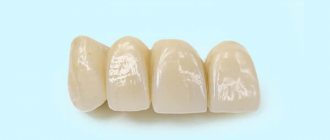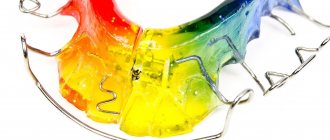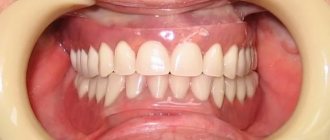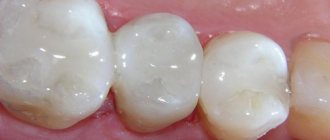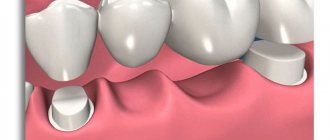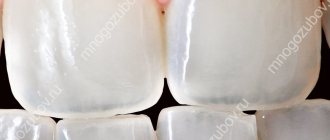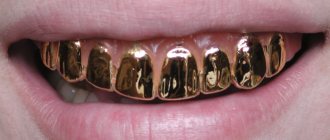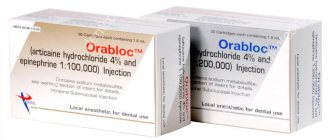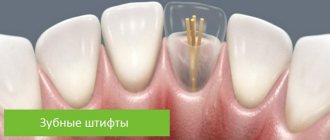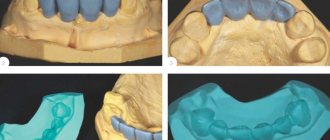General characteristics
Titanium crowns are popular because they have identical characteristics to products made from more expensive materials. Like gold, titanium is a biocompatible metal and does not cause allergic reactions.
Today, a large number of different crowns, implants and prostheses are made from titanium. Structures can be removable or permanent.
Titanium has high compatibility with the body and in rare cases is not perceived by contacting tissues.
Crowns made of titanium can perform several functions:
- Support.
- Aesthetic.
- Restorative.
- Protective.
The products have many advantages over structures made from other metals; there are practically no disadvantages, which allows them to be used for various dental disorders.
Advantages
Prosthetic structures are popular because they have many advantages, which distinguishes them from other structures. These include:
- Reliability and durability. The strength indicator is 10 times greater than that of other alloys.
- Corrosion resistance. They are not amenable to change under the influence of external factors and oral microflora.
- No negative impact on the tissues of neighboring elements. This is due to the ability of the metal to create a protective oxide layer that prevents the release of free ions.
- Safety . The material is harmless and does not release toxins when interacting with the microflora of the oral cavity.
- Does not cause allergies. The material is completely hypoallergenic.
- Has increased density. Unlike the natural crown part of the tooth, titanium is 8-10 times denser.
- Does not provoke changes in the marginal periodontium . The crown has thin walls and ends at the level of the gum edge.
- The material is easy to process. This greatly simplifies the manufacturing process of the structure.
- Preserves tooth enamel. Insignificant need for preparation and ensuring full functioning of the antagonist tooth.
- Has a neutral taste. There is no metallic taste in the mouth.
- The material is quite light and is not felt in the mouth.
- Titanium is not magnetic.
In addition, the material on X-ray images is completely transparent, which allows carious changes to be identified in a timely manner and treatment can begin.
Due to the fact that the crown is easily removed, a specialist can immediately carry out treatment and prevent the spread of the pathological process to neighboring molars.
Causes of pathological tooth abrasion and ways to correct the situation.
Come here if you are interested in what metals are most in demand in dentistry.
At this address https://zubovv.ru/protezirovanie/nesemnyie-p/ottisknyih-materialah-v-ortopedicheskoy-stomatologii.html we invite you to familiarize yourself with modern impression materials used in dentistry.
General characteristics of titanium crowns
Titanium is one of the metals on the basis of which non-removable orthopedic products are made in dentistry. These include single crowns (hollow “caps” covering the visible parts of the teeth) and bridges (consisting of at least 3 attachments). Sometimes the material serves as the basis for removable dentures, but for this purpose it is used less frequently.
What kind of doctor puts crowns on teeth?
Titanium is a traditional type of metal for fixed dentures. It has the following qualities necessary for orthopedic treatment:
- bioinertness – the material is compatible with body tissues and does not cause negative reactions;
- refractoriness;
- wear resistance and corrosion resistance.
Crowns are made on the basis of pure titanium or its alloy with molybdenum, aluminum, and vanadium. Sometimes gold plating is done on the inside of the prosthesis - this increases the structure’s resistance to corrosion processes and reduces the risk of bacterial plaque accumulation. And the outer side is lined with ceramics.
Titanium is a traditional type of metal for fixed dentures
Flaws
Like any dental metal, titanium has a number of disadvantages, which does not allow its use in certain cases of dentition.
These include:
- Relatively low precision of crown fit. Titanium is difficult to mill, and it is not recommended to cast the material for prostheses, since when exposed to high temperatures it loses its biocompatibility.
- Not in all situations the material can be used for the manufacture of frames when creating metal-ceramic crowns.
Titanium has a low level of adhesion to ceramics, and during the manufacture of such structures, a special low-temperature type of ceramic is used, which is inferior in all qualities to the standard coating.Thus, metal-ceramic crowns cannot last long and will soon require replacement.
- In addition, titanium crowns are aesthetically imperfect , which does not allow them to be installed on the front teeth. The design is most often used to restore chewing molars.
Many patients cite high cost as a disadvantage. But titanium crowns, unlike products made from other high-quality materials, are much cheaper.
Despite a number of disadvantages, titanium is very popular in dentistry and other fields of medicine. Thanks to its qualities, specialists are able to create a crown with high strength, stability and durability.
Advantages and disadvantages
Prosthetic structures have a number of advantages:
- High strength - more than ten times higher than alternative alloys;
- Resistance to corrosion and the action of pathogenic bacteria and microbes;
- Safety for the body - the material is non-toxic and does not affect tooth enamel;
- Ease of metal processing in the manufacture and installation of prostheses;
- No foreign taste or magnetic properties.
In addition, titanium crowns on teeth are convenient for further observations by a doctor - the metal is transparent under the influence of X-rays, making it possible to detect pathologies and caries in the early stages of development.
The disadvantages that no dental material can do without include:
- Insufficient accuracy of fit of the installed crown;
- Low efficiency in combination with metal-ceramics, reducing service life;
- An aesthetic imperfection that does not allow the use of titanium for anterior teeth.
Disadvantages also include the cost of prostheses. At the same time, it must be recognized that other materials with similar characteristics are significantly more expensive.
Indications
Titanium crowns are intended to restore the aesthetics of the dentition in case of various chips or cracks. Also, indications for installing the structure are:
- Restoring the function of destroyed molars. Thanks to the properties of titanium, after the crowns are installed, the patient can chew food fully.
- Protection of hard tissues. They perfectly protect teeth during pathological abrasion, when their height decreases. The material is quite durable and reliably protects from further destruction.
- Insufficient mineralization of hard tissues of dental elements.
- Prolonged use of orthopedic and orthodontic structures, when irreversible destruction of the protective layer of hard tooth tissue occurs.
- Thinning of the walls of teeth under heavy loads, as a result of the spread of caries, after treatment or filling.
- Hypoplasia, dysplasia or aplasia , when there is a lesion of the non-carious nature of the origin of baby teeth in children.
- Localization of fillings on one of the two proximal surfaces of permanent or primary teeth.
- The presence of fillings that cover more than 2/3 of the tooth surface.
- Underdevelopment of enamel . This process is considered irreversible and is an absolute indication for the installation of protective structures.
What activities begin with the preparation of teeth for prosthetics and the preparation technique.
This publication provides detailed information about a porcelain tooth crown.
Here https://zubovv.ru/protezirovanie/nesemnyie-p/koronki-np/shovnyie-iskusstvennyie.html we’ll talk about the justification for using suture artificial crowns.
Indications for installation
Typically, a titanium dental prosthesis is recommended for replacing severely damaged or lost units, restoring chewing and aesthetic functions. In addition to these reasons, the structure is installed when:
- insufficient mineralization of teeth, increased abrasion;
- hypoplasia (insufficient development), aplasia (congenital absence of a unit or part thereof) and dysplasia (improper formation of the coronal part) in children;
- injuries, chips and cracks;
- severe tooth decay - if it occupies half the contact area or 2/3 of the height;
- replacement of prosthetic structures made of other materials - as a result of their breakage or repeated treatment of abutment teeth.
The only contraindication is severe tooth decay, in which the root system cannot be preserved. Also, in children, it is not recommended to have prosthetic jaw rows until the units have completely erupted.
How are the manufacturing and installation process?
The titanium frame is made using CAD/CAM technology - computer modeling of the prosthesis, followed by milling from a single block using an automatic installation.
The titanium frame is made using CAD/CAM technology
Otherwise, the production of a dental structure is no different from the creation of other prostheses. It happens in several stages:
- diagnostics - X-rays are used to determine the condition of soft and hard tissues, the presence or absence of inflammatory processes;
- sanitation of the oral cavity - as necessary;
- if necessary, depulpation of the tooth under the crown or repeated endodontic treatment;
- turning the tooth for a prosthesis or, in case of severe destruction, restoring the coronal part with a stump insert - it is also made of titanium;
- taking impressions and making diagnostic impressions;
- fitting and fitting of orthopedic structures;
- if the product is suitable, it is lined with ceramics of a suitable color;
- securing the crown with bond (cement) at the last visit.
Prosthetics take 2-6 weeks. The duration depends on the number of teeth being replaced and the volume of preliminary procedures: treatment of caries, extraction, depulpation, etc.
After installation, the orthopedic dentist prescribes 1-2 follow-up visits. On them, the doctor evaluates how the prosthesis fits. The patient’s task is to report possible discomfort or strange sensations.
After installing the crown, you will need to visit the doctor 1-2 more times.
Manufacturing and installation
The manufacturing process consists of several stages. The main work is done in the laboratory, but the quality and accuracy of the work depends on the work of the orthodontist, who takes impressions.
First of all, the dentist, after examining the oral cavity and determining the degree of destruction, carries out a complete sanitation.
This is necessary to get rid of carious lesions and relieve inflammation, as they can cause the development of many oral diseases in the future.
Before taking impressions, the doctor prepares the teeth. To do this, using a special apparatus, up to 2 mm of the top layer of enamel is removed.
Today in dentistry several preparation methods are used:
- Laser. A high-precision laser is used.
- Ultrasonic preparation.
- Air-abrasive.
- Application of turbine installation.
After preparing the oral cavity and prosthetic teeth, the dentist makes impressions , which are then sent to the laboratory for further production of the prosthesis.
After receiving the material, the technician creates two models. One is working and is made from silicone. The second completely recreates the opposite row of teeth and is made of plaster.
Models of both jaws are placed in an articulator, where plaster casting occurs, and then the future titanium structure is modeled from wax. The crown is made according to the following algorithm:
- The model of the tooth that needs to be restored from the plaster model is coated with a special varnish.
- The wax is melted in a wax furnace and the prepared model is placed in it for 1-2 seconds.
- Depending on the wax layer, the procedure is repeated the required number of times.
- Additional modeling of certain areas of the tooth.
- After checking all the parameters, the workpiece is transferred to the foundry department, where the wax is replaced with titanium. The manufactured structure is transferred to a technician, who refines it, tries it on a plaster model, where the specialist determines its relationship with the antagonist teeth. The crown is handed over to the dentist.
After receiving the finished product, the orthodontist installs it. If necessary, the crown can be sent to a technician for adjustment.
Service life and recommendations
Titanium is one of the most durable materials. Crowns made from this metal can last more than 20 years. If used correctly, they will not require replacement or repair for a long time.
To extend the service life, experts recommend following a number of rules of use:
- Brush your teeth regularly. Due to the nature of the material, a titanium crown may not fit tightly enough, which can result in the accumulation of bacteria. Oral hygiene will protect against the development of caries.
- Use special brushes and floss to clean the space between teeth.
- Rinse your mouth with mouthwash recommended by your doctor.
- Do not put any stress on the restored tooth.
Due to the strength of titanium, the patient can chew food fully after installation of the product. But despite this, you should not overload the prosthesis. You should limit your intake of solid foods, such as nuts and seeds.
The cost of installing turnkey crowns in Moscow
Titanium prostheses are relatively inexpensive. They are at least 1.5-2 times cheaper than metal-ceramic crowns. So, the average cost in Moscow dentistry is as follows:
- 3,000 – 4,500 rubles for a crown made of titanium alloy with aluminum, molybdenum or vanadium;
- 6,000 rubles per unit of pure titanium;
- 6,500-7,000 rubles for a prosthesis with internal gold plating.
The prices shown are for titanium crowns with ceramic lining. Additional costs (treatment, production of a stump inlay, plaque removal, etc.) are calculated individually.
Titanium-based crowns are the best option if you need strong, durable and inexpensive prostheses. They are suitable for replacing and restoring molars and premolars. But it is recommended to install structures made of zirconium dioxide or solid ceramics in the smile area - they look more natural.
Price
Many people believe that titanium is an expensive material. But it is much cheaper than other high-quality materials. It perfectly combines price and quality.
The cost of one titanium crown ranges from 4,500 to 5,500 rubles. It is worth remembering that treatment and installation of a crown are not included in this amount.
The final price depends on the qualifications of the doctor, the clinic where the installation is carried out, the degree of destruction of the dentition element and other factors.
Reviews
Titanium crowns are very popular all over the world. The material is quite durable and lightweight.
In the comments, you can share your impressions about the installation and service life of titanium crowns.
If you find an error, please select a piece of text and press Ctrl+Enter.
Tags crowns fixed dentures titanium crowns
Did you like the article? stay tuned
